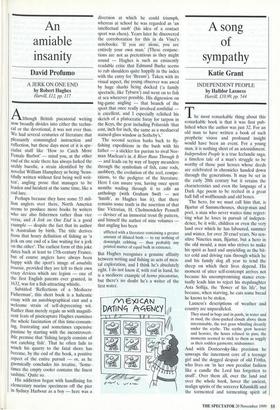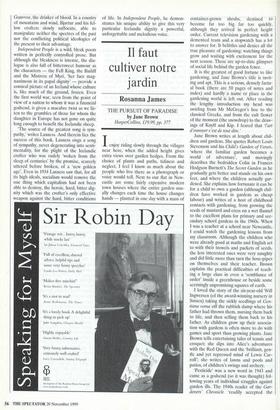A song of sympathy
Katie Grant INDEPENDENT PEOPLE by Halldor Laxness Harvill, £10.99, pp. 544 The most remarkable thing about this remarkable book is that it was first pub- lished when the author was just 32. For an old man to have written a book of such prophetic vision and profound insight would have been an event. For a young man, it is nothing short of an astonishment. Independent People is a true Icelandic saga, a timeless tale of a man's struggle to be worthy of those past heroes whose deeds are celebrated in chronicles handed down through the generations. It may be set in the early 20th century but it retains the characteristics and even the language of a Dark Age poem to be recited in a great hall full of wolfhounds and old bones.
The hero, for we must call him that, is Bjartur of Summerhouses, sheep-man and poet, a man who never wastes time regret- ting what he loses in pursuit of indepen- dence, be it wife, children or even the very land over which .he has laboured, summer and winter, for over 20 cruel years. No sen- sitive Nineties man, Bjartur, but a hero in the old mould, a man who strives to make his spirit as hard and unyielding as the bit- ter cold and driving rain through which he and his family slog all year to tend the sheep on which their lives depend. His moment of utter self-contempt arrives not because his uncompromising stance even- tually leads him to reject his stepdaughter Asta Sollija, the 'flower of his life', but because, when starving, he eats some bread he knows to be stolen.
Laxness's descriptions of weather and country are unparalleled.
They stood in bogs and in pools, in water and in mud, the close-packed clouds above them interminable, the wet grass whistling drearily under the scythe. The scythe grew heavier and heavier, the hours refused to pass, the moments seemed to stick to them as soggily as their sodden garments; midsummer.
And with Dostoevsky-like precision he unwraps the innermost core of a teenage girl and the dogged despair of old Fritha, who lives on 'in her own peculiar fashion like a candle the Lord has forgotten to snuff. Over them all, over the land and over the whole book, hover the ancient, malign spirits of the sorcerer Kilumkilli and • the tormented and tormenting spirit of Gunwor, the drinker of blood. In a country of mountains and wind, Bjartur and his fel- low crofters slowly suffocate, able to manipulate neither the spectres of the past nor the conflicting political ideologies of the present to their advantage.
Independent People is a wild, bleak poem written in perfectly controlled prose. But although the bleakness is intense, the dia- logue is also full of bittersweet humour as the characters — the Fell King, the Bailiff and the Mistress of Myri, 'her face mag- nanimous in its papal dignity' — provide a comical picture of an Iceland whose culture is, like much of the ground, frozen. Even the first world war, seen from the point of view of a nation to whom it was a financial godsend, is given a macabre twist as we lis- ten to the grumbles of those for whom the slaughter in Europe has not gone on quite long enough to benefit the Icelandic sheep.
'The source of the greatest song is sym- pathy,' writes Laxness. And therein lies the success of this book. Laxness sings a song of sympathy, never degenerating into senti- mentality, for the plight of the Icelandic crofter who was rudely 'woken from the sleep of centuries' by the promise, scarcely uttered before broken, of a 'new golden age'. Even in 1934 Laxness saw that, for all its high ideals, socialism would remove the one thing which capitalism had not been able to destroy, the heroic, hard, bitter dig- nity which was the crofter's only effective weapon against the hard, bitter conditions of life. In Independent People, he demon- strates his unique ability to give this very particular Icelandic dignity a powerful, unforgettable and melodious voice.



























































































 Previous page
Previous page